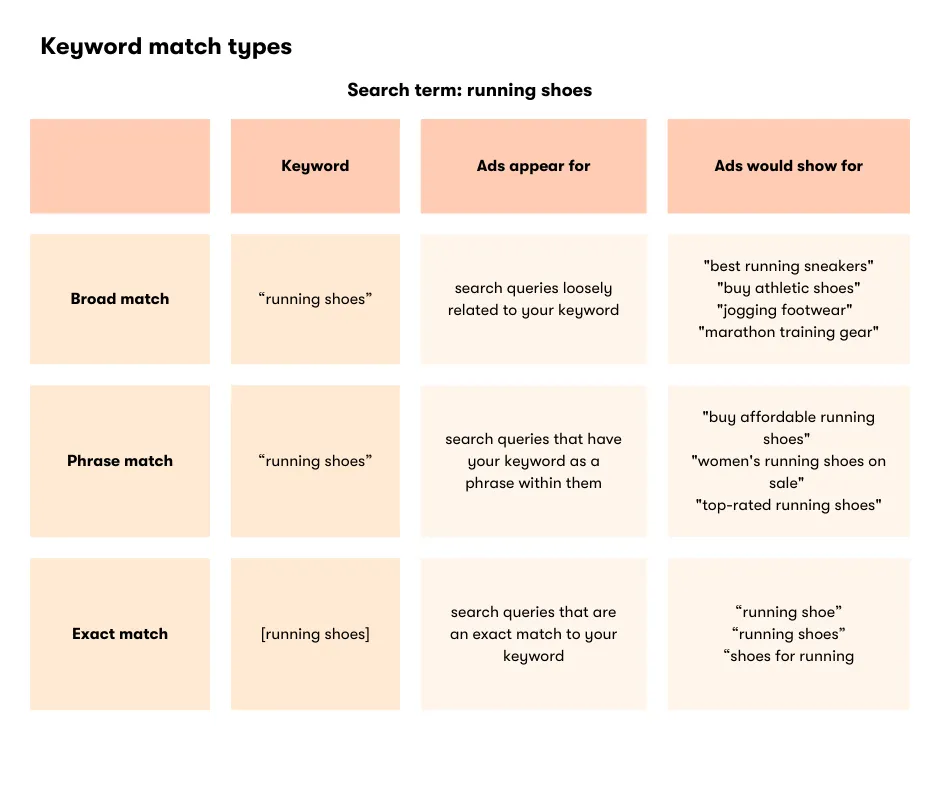Beginners Guide to Amazon PPC Match Types: Broad vs. Phrase vs. Exact Match
Learn all about how to use Amazon PPC match types for more successful ads. Don't miss these tips on broad keywords and key-phrases, and exact keyword matches.
Updated March 30, 2024

In 2022 alone, Amazon raked in over $470 billion in net sales, firmly establishing itself as the world's leading eCommerce giant. Savvy sellers leveraging Amazon's Pay-Per-Click (PPC) advertising to optimize their product visibility and sales contribute a substantial chunk to this astronomical figure. As the marketplace becomes increasingly competitive, understanding the intricacies of Amazon PPC match types—broad, phrase, and exact—is a necessity.
Meet the Expert
Jameela Ghann is a seasoned online store owner with over a decade of eCommerce experience. Apart from running Alora Boutique, she's also the marketing manager for Fera Product Reviews.
What are Amazon PPC match types?
Amazon PPC match types are a set of targeting options that advertisers like you can use to determine how closely they want their keywords to match user search queries. These match types help advertisers control the precision and reach of their campaigns, ensuring that their ads reach the most relevant audience. Amazon PPC typically has three match types: broad match, phrase match, and exact match.
» Learn to create better PPC ads with ChatGPT.
Broad vs. phrase vs. exact match: What's the difference?
Knowing the difference between the three main keyword match types is essential to make informed and cost-effective decisions for your PPC campaigns. Understanding these match types can help optimize your ad structure, budget allocation, and targeting.
1. Broad match
When using broad match keywords, your ads appear for a wide range of loosely related search queries. It could include synonyms of the word, misspellings, related searches, and relevant keyword variations.
For example, if you use "running shoes" as a broad match keyword, your ad might show for searches like "jogging sneakers."
Pros
- Maximum reach and potential impressions
- Discovery of new or unexpected keywords
- Suitable for brand awareness campaigns
Cons
- Risk of irrelevant clicks and higher spending
- Lower conversion rates
2. Phrase match
When using phrase match keywords, your ads appear when the search query includes your keyword phrase in a specific order, but it can also contain words before or after.
For example, if your phrase match keyword is "running shoes," your ad could appear for searches like "best running shoes for beginners."
Pros
- More targeted than broad match
- Balances reach and relevancy
- Discovery of new keyword variations
- Control over match variations
- Cost-effective
Cons
- Less targeted than exact match
- Potential for irrelevant clicks
- Requires ongoing monitoring
- Competition for popular keywords
3. Exact match
When using exact match, your ads only appear when a user's search query exactly matches your chosen keyword or close variations—providing highly targeted advertising and ensuring minimal wastage.
For example, if your exact match keyword is [running shoes], your ad will only display for that precise search term.
Pro tip: Use [square brackets] around your exact match keyword to indicate that you want your keyword to match a search query exactly.
Pros
- Highly precise and targeted
- Cost-effective
- Control over ad spend
- Protects brand terms
- Optimal for specific keywords
Cons
- Limited reach
- Higher competition
- Missed opportunities on potential traffic
- Regular maintenance required
» Find out how you can choose the right PPC agency for your eCommerce business.
Mistakes to avoid when selecting Amazon PPC match types
- Overusing broad match keywords: Broad match keywords can lead to wasted ad spend and irrelevant clicks. Without proper management, your ads may appear for unrelated search queries.
- Neglecting negative keywords: Regularly add negative keywords (search terms you specify as undesirable or irrelevant) to your campaigns. This helps refine your targeting and ensures your ads reach the right audience, reducing ad spend wastage.
- Underestimating exact match:
While they may limit reach, they can be highly profitable for high-converting keywords with decent traffic. Research and strategic use of exact match keywords can yield excellent results. - Not conducting keyword research: Keyword research helps you identify your products' most valuable keywords. Skipping over this step could lead to ineffective and costly campaigns.
- Avoiding match type testing: Conduct A/B testing to assess the effectiveness of different match types for specific keywords.
- Ignoring seasonal trends: If you're adapting your PPC campaigns to seasonal trends, you could take advantage of growth opportunities.
- Forgetting landing page optimization: Your landing pages should be user-friendly, relevant, and optimized for conversions.
- Not managing the budget correctly: Regularly monitor and adapt your budgets to ensure they align with your campaign goals.
By balancing your match types and diligently managing negative keywords, you can optimize your ad campaigns for better performance and cost-effectiveness.
» Looking for an Amazon PPC expert? We can help.
Optimizing your keyword selection and bidding strategy
To maximize the effectiveness of your PPC advertising campaigns, you have to optimize your keyword selection and bidding strategy. Here are six steps you can take to do exactly that.
1. Start with comprehensive keyword research
Research relevant PPC keywords that prospective customers will likely use when searching for products similar to yours. Organize your keywords into separate ad groups/campaigns based on their match type. This keyword research framework will ensure better control and optimization of your keywords.
2. Select your broad match keywords
Start with lower bids to gather data and identify new keyword opportunities and a broader audience. Review search term reports to discover common misspellings or related terms. Then, you can add relevant terms as positive and negative keywords to refine targeting.
3. Select your phrase match keywords
Use phrase-match keywords for moderate relevance and search volume. You can start bidding slightly higher than broad match keywords to capture more specific searches and adjust your bids based on the search term performance. Make sure to align your ad copy with user search intent.
For example, if you're selling organic skincare products, start with broad terms like "organic skincare," "natural skincare," or "chemical-free skincare," and adjust these over time based on performance. Set your bids at a moderate level to ensure you have enough budget to gather the data. After this, monitor your report and add relevant or negative keywords to refine your targeting.
4. Select your exact match keywords for precision
As you gather data, transition to exact-match keywords for precision and high-impact targeting. Bid higher on specific, high-intent keywords that perform well, such as "organic anti-aging skincare." Ensure your product and copy align with the user search intent. For example, you might find that "organic skincare for men" performs better than "organic skincare."
5. Continuous monitoring
Monitor KPIs such as click-through rate (CTR), conversion rate, and return on ad spend (ROAS) for each keyword and match type. You should also analyze your data consistently, adjust bids, and add negative keywords to improve targeting. After this, you can set your bids slightly higher because they'll likely have higher intent.
Focus on high-performing keywords and allocate more of your budget to keywords delivering a solid ROI. Remember to watch your competitors' strategies to remain competitive in your niche.
6. Consider automated bidding options
Once you fully understand automated bidding options better, consider using Amazon's automated bidding tools to help optimize your bids based on your goals.
» Here's how you can improve your Amazon conversions.
Unlock the full potential of your PPC campaigns
Mastering Amazon PPC match types can be your key to unlocking the full potential of your advertising campaigns. Remember, the strategic use of match types isn't just about clicks and conversions—it's about connecting with your audience, understanding their intent, and optimizing your brand's presence. Need help? Talk to one of our expert Amazon marketing agencies today!






